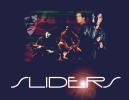| |
 Time
Travel in Entertainment Time
Travel in Entertainment |
| |
|
Time travel has always captured the imaginations
of the public. The very beginnings of time travel literature can be
traced to In the Year 2440, by L.S. Mercier in 1771. The main character
traveled through the future as a result of an elongated summer, approximately
six hundred and seventy year (Flynn 2-3). Later, Charles Dickens added
to the sub-genre in 1843 with his novel A Christmas Carol. This was
the first novel to utilize the idea that a character could travel back
and forth through time. The science aspect was lacking, however, since
the character of Scrooge was led through time by ghosts (Flynn 2). The
idea of traveling through time at will was not lost on H.G. Wells in
1888 when he published The Time Machine. In this book for the first
time, the time machine is employed. At this point, the sub-genre of
science fiction finally included an element of science. After Wells’s
novel, the popularity of time travel in popular entertainment exploded
(Clute 1227). Now there are countless novels, stories, movies, and T.V.
programs that utilize some form of time travel.
| Examples of Time Travel in the
Newtonian Universe |
|
"Express to the Future" by Michael
Verne (1895) |
 |
"Rip Van Winkle" by Washington
Irving (1819) |
 |
Examples of Travel in the Multi-Verse |
|
The FOX Televion Show Sliders (1990's) |
 |
"Store of the Worlds" by Robert
Sheckley (1959)
|
 |
Examples of Time Travel in Einstein's
Universe
|
|
|
Timeline by
Michael Crichton (1999)
|
 |
Contact (1997) by Warner Brothers
Studio
|
 |
|

